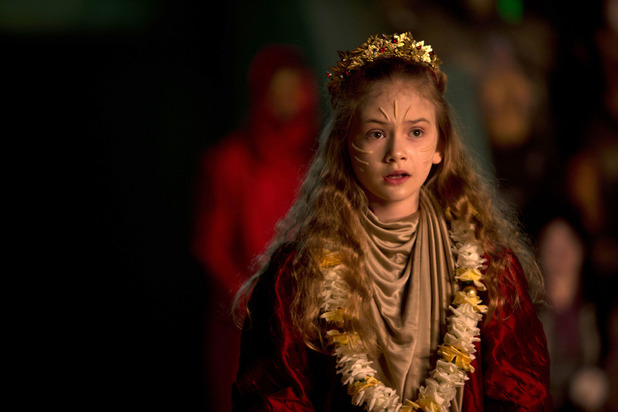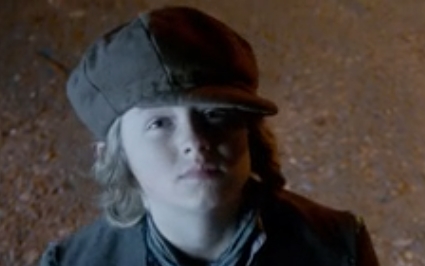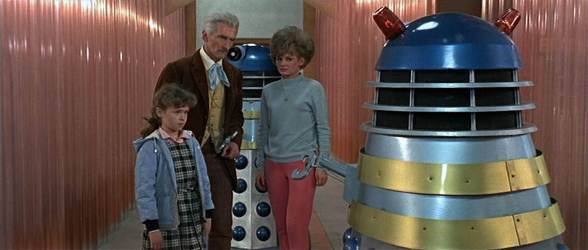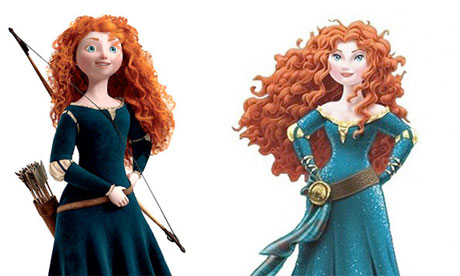"Be brave and learn things. That's what Doctor Who is about. Not be pretty and the Doctor will fancy you."
Those are words of wisdom from my mum, spoken as we shared our feelings about Saturday's episode of
Doctor Who,
"Nightmare in Silver".
There are many things that have bothered me about this series so far, not least its inconsistency. Out of a total of six episodes, two have been forgettable, two have been pretty well incoherent, and two have been
fantastic. The problem with this is that the really good episodes are so good that they leave me reluctant to give up watching altogether, however terrible the bad bits are.
 |
| Brave: The Queen of Years |
After a slow, rather oomph-less start this year with "The Bells of Saint John", which was high on concept but low on narrative tension and character development (not to mention its featuring an embarrassingly high volume of advertisements for a BBC programme - off the top of my head, logos were clearly displayed for Twitter, Google and Facebook, amongst others), we moved on to the first episode that simply didn't make any sense. "The Rings of Akhaten" started out well. I'm always pleased on those odd occasions when they actually decide to set something on another planet, since it makes no sense to me that that the Doctor would be constantly hanging around 21st-century Earth with all of time and space at his disposal. In this episode, he finds himself at a festival marketplace that is something like a cross between the Mos Eisley Cantina and the observation deck in "The End of the World" (New Who Series 1). On top of this, the story centres on a little girl, who also happens to be the Queen of this alien planet. So far, so good. Unfortunately, it all ended rather anticlimactically, with some magic business to do with stories and souls. I understand that there was some metaphorical point being made here, but I don't really understand why, if Clara's potential stories were enough to over-feed and blow up the baddie god, the Queen of Years' potential stories wouldn't have done the same, particularly bearing in mind that she's a child with, presumably, considerably more life left to live than Clara or her parents. But I've spoken about this lazy resort to magical solutions before.
 |
Professor Grisenko: Loves Ultravox and
Duran Duran |
Just as I'd pretty much lost hope of seeing any halfway decent episodes this year, however, we were hit with two brilliant ones in a row. First came the wonderful and thoughtful "Cold War", which featured the most intelligently drawn antagonist I've seen in
Who since "A Town Called Mercy". This episode was a cleverly conceived piece about war, power and desperation which - as should really always be the case - strove to tell us more about humanity than it did about any alien threat. It also included some fabulous characters, particularly Professor Grisenko, a Russian military scientist with a passion for 80s British pop. Most importantly of all, it never took sides. Unlike any of the rather cringe-worthy episodes featuring Winston Churchill, "Cold War" emphasized both the self-perpetuating nature of militarism, and the fact that in war, there are no real winners. Even when Grand Master Skaldak, the Ice Warrior, found himself without comrades and with nothing left to fight for, he decided to take his revenge on whoever was closest, because his culture and world-view required him to have an enemy. In much the same way, Cold War Russia and America made villains of each other, even when there was nothing real to fight about.
 |
| Braver: Emma Grayling |
"Hide", the 1970s follow-up to this, saw writer Neil Cross pull himself back on form after the mess that was
"The Rings of Akhaten". This episode featured more exciting characters, with fantastic performances from Dougray Scott and Jessica Raine, and some interesting musings on the nature of love and empathy. Like "The Rings of Akhaten", this episode had a strong and brave female character at the heart of its story: it was down to empath Emma Grayling to save the day. Furthermore, contrary to the expectations that the story built up, the most important personal connection turned out to be that between a woman and her [insert multiple greats here] granddaughter, rather than the romantic one between Emma and Professor Alec Palmer.
 |
| Weird Pointless Zombie Things |
It was back to incoherence with "Journey to the Centre of the Tardis", whose characters fell utterly flat, and which seemed not to have bothered with anything vaguely resembling a plot at all. There's not much positive I can say about this epsiode, other than that it was interesting to see the expanses of the Tardis being explored.
"The Crimson Horror" saw the always-welcome return of fan favourites Madame Vastra and her assistants Jenny and Strax, as well as by far the series' best gags. Unfortunately, though, the story just didn't hold water, or wasn't fully explained. Why was Mr. Sweet so picky about only preserving the fittest humans? Surely a leech would be largely indifferent about its food source - there aren't many conditions that a human can pass on to an
 |
"Turn around where possible. Then, at the end of the road,
turn right." - Thomas Thomas |
invertebrate, and blindness and scarring certainly aren't amongst them. Also, what on earth was the Doctor supposed to have done to cure himself and Clara of the paralysis? More irritating jiggery pokery.
Then came the icing on the cake. "Nightmare in Silver" was far and above
the most eagerly anticipated episode this series, as well as the most whole-heartedly disappointing one. Once again, the New Who team proved that they have absolutely no comprehension of what a Cyberman is supposed to be, and what it is that makes them so terrifyingly believable. True, this story moved away from the style of Cybermen that they've been using so far, which are so inhuman as to be virtually indistinct from Daleks, other than being vaguely man-shaped. Unfortunately, the re-styled ones it offered were even worse and more redundant: here we were presented with yet another alien threat designed to bring out the deep, dark secrets of a romanticised (in both senses) Doctor (see, amongst others
"Amy's Choice"). The episode essentially takes the form of an excursion inside the Doctor's head. Thinking about
The Sandman comics series, I guess in some sense this is very Gaiman. On the other hand, one might have expected a gothic fantasy writer not only to have leapt at the chance to restore the Cybermen to all their original chilling glory, but also to have made a better use of the dilapidated fairground set which was promised but never actually delivered. This failure to deliver extends to many other things across this episode. We were promised interesting child characters à la
Sarah Jane Adventures; these then went on to spend most of the story staring vacantly into space. We were also promised Warwick Davis and Jason Watkins; both were largely wasted. And then, worst of all, were the constant nudge-nudge, wink-wink hints that the Doctor secretly fancies Clara. Clara, who goes around the whole of this episode acting important but not really doing anything or having any power because the Emperor is there in disguise all along. Clara, who, throughout the entire series, has displayed no personal qualities or characteristics whatsoever, other than, I suppose, a taste for soufflé. Clara, who somehow manages to win over the Emperor as well as the Doctor without apparently doing anything or being anyone. This was
maddening. Clara is doubly objectified here, even if she does turn the Emperor down. And as if all that wasn't bad enough, the story finishes with the blowing up of a planet - the outcome that, up until this point, everyone has been striving to avoid. Apparently, the Doctor is okay with genocide now. Let's pretend "Genesis of the Daleks" never happened. As a big Neil Gaiman fan, all I can say is that I hope most of the worse decisions here were out of his hands.
 |
| Pretty Vacant: Clara Oswin Oswald |
Clara, predictably, has been the biggest problem across the entire series. Kissogram Amy Pond and her annoying daughter (and of course, all the inappropriate gags that came with them) were worse than bad enough, but next to a non-character like Clara, both look positively engaging and progressive. At least they were actually
people. They
did things and
felt things. Clara, on the other hand, remains the same empty shell of a plot device that she started out as. A quick Google image search will throw up dozens of photos, all with pretty much identical expressions to the one above. No disrespect to Jenna Louise Coleman. I don't really know what she'd be capable of given a stab at a better role, but I now truly believe that her character is the worst thing that Steven Moffat has done to
Doctor Who so far. She is pure fantasy, a
Manic Pixie Dream Girl, as Anita Sarkeesian would have it. Clara is, in the Doctor's own words,
 "the impossible girl: a mystery wrapped in an enigma, squeezed into a skirt that's just a little bit too tight."
"the impossible girl: a mystery wrapped in an enigma, squeezed into a skirt that's just a little bit too tight."
There's no significant context for this quotation that I'm missing out - we can fairly well consider these words truthful as the Doctor speaks them in a confessional moment, alone inside the Tardis at the end of an episode.
It is a disgrace.
I have no other way of putting it: if that quotation isn't self-explanatory, then you may as well not bother reading on. I suggest you go read some books and talk to some women instead.
The weekend before last, I went to a talk by some
Doctor Who comic and novel writers, followed by a screening of the 1965 film,
Doctor Who and the Daleks, as part of the
Sci-Fi London Festival. In this film, the Doctor's main companion is his clever, bolshy young granddaughter - a child who uses her brain and even risks her own life to save the day. She outsmarts Daleks, shows up her sister's silly boyfriend, and proves even to be smarter and better-natured than "Doctor Who" himself. Although this film is considered non-canonical by those who make up the (rather arbitrary, if you ask me) rules about these things, for me, it really does epitomize everything that
Doctor Who is supposed to be about. Okay, so its script is a little clunky, particularly in the Dalek-to-Dalek expositional exchanges, and perhaps the monsters are a bit too easily beaten, but at its heart, this is a very moral film, in which learning and discovery are valued, teamwork and intellect are the best tools for problem-solving, and the fact that it is essentially written for children is never lost sight of. It's also exciting: unlike most of New Who, this film shows us a truly alien world, with a set that in 1965 would have looked incredibly bizarre and futuristic. It's about the horror of war, and the devastation and divisions it leads to. It's about how technology can have both positive and negative effects. It's about having adventures, meeting new people, and learning not to be prejudiced or make assumptions about them. The Doctor and his companions assume that the aliens in the woods will be scary and bad, while those in the city will be civilized and helpful, while in fact, the opposite turns out to be true. In this way, its characters are dynamic and complex. In some way, all the characters change between the beginning and the end of the film. They are brave, and they learn things. And no one is romantically involved with the Doctor, who is what he should always be - a funny old man who likes having adventures.
 |
| Awesome Role Model Susan Bravely Faces the Daleks on Skaro |
Unfortunately, all of the things that make this film good are increasingly absent from the
Doctor Who television series. Individual stories and the all-important sense of excitement and adventure have been dispensed with in favour of drawn-out series arcs centred on ideas, themes or mysterious "characters" like River, Clara and The Master. Characters are static, failing to grow, learn and develop. "Monsters" and aliens are generally bland and indistinct (there are significant exceptions to this). Plots go nowhere, trailing off anticlimactically, and are bankrupt of any kind of morality - nowadays, the Doctor is happy to blow up planets and kill people. The series is no longer really appropriate for children: anyone who has watched with kids will surely know what its like to flinch at the perpetual barrage of innuendo and sexual subtext. Worst of all though, is that no female character over the age of eighteen is safe from Steven Moffat's lascivious pen. [insert relevant Clyde Langer quip here] It's quite shocking when the gender politics of a 1960s genre film clearly outstrip those of its related 21st century BBC TV series. I don't think anyone could have anticipated that.
 |
| From Brave To Sexy |
Interestingly, all this is happening alongside a
massive media buzz about a petition to Disney started by anti-gender-stereotyping organization,
A Mighty Girl. The
petition, which criticizes the sexualization of
Brave heroine Merida, has recently received backing from Merida's creator, Brenda Chapman. Chapman not only conceived the initial idea for the film, but was originally employed as its director, before leaving the project due to "creative differences". In the light of Disney's current attempts to sabotage her vision of a young, active heroine who is not yet ready for romantic attachment, there are fairly strong grounds for guessing at what these "differences" might have been.
This emphasis on the appearance and desirability of just about every female character going is an extremely troubling one, which effectively renders all women (and even, in Merida's case, teenage girls) passive objects of the male gaze, stripping them of any agency, or at least distracting attention away from it, making their actions and decisions subordinate to their looks - that is to say that what they think and do is less important than what men think about them and do about that.
One might well question the relative importance of how fictional characters are portrayed, when real women face real problems every day as a result of sexism - "there are bigger things to complain about" is a common response to feminist criticism of this kind. But the impact of these character portrayals should not be underestimated. Fiction and fantasy have traditionally been arenas in which other possibilities can be explored, providing people - and especially children - with alternative perspectives and ways of looking at the world. If our children are absorbing the same misogynistic messages from both real-world gender inequalities and from the fictional stories they grow up with, what room is there left for them to question the social and cultural norms that persistently disempower women? Essentially, it all comes down to this: what kind of values do we want our children to grow up with?
For me, it's summed up nicely by that quote I started out with. If you could tell all children (and girls particularly) just one thing, you could do a lot worse than that. Be brave and learn things. Everything else will follow.












+Red+(costume).jpg)


